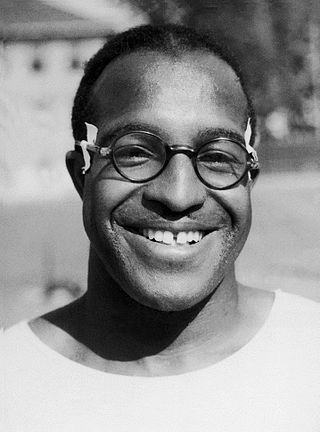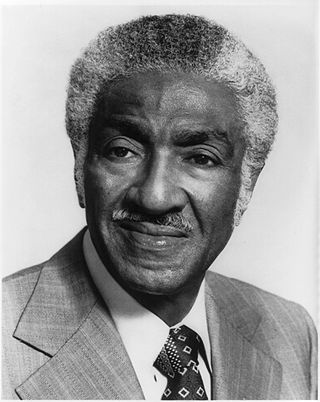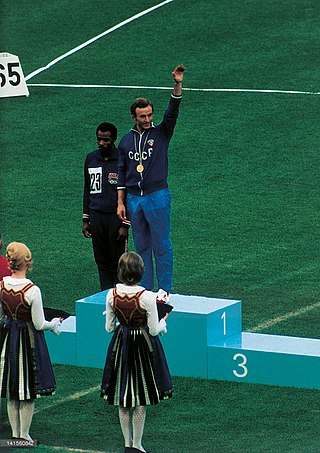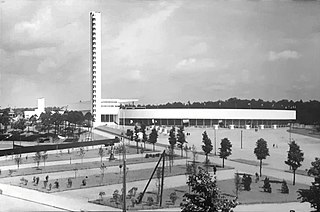
Thomas Edward "Eddie" Tolan, nicknamed the "Midnight Express", was an American track and field athlete who competed in sprints. He set world records in the 100-yard dash and 100 meters event and Olympic records in the 100 meters and 200 meters events. He was the first non-Euro-American to receive the title of the "world's fastest human" after winning gold medals in the 100 and 200 meters events at the 1932 Summer Olympics in Los Angeles. In March 1935, Tolan won the 75, 100 and 220-yard events at the World Professional Sprint Championships in Melbourne to become the first man to win both the amateur and professional world sprint championships. In his full career as a sprinter, Tolan won 300 races and lost only 7.

Ralph Harold Metcalfe Sr. was an American track and field sprinter and politician. He jointly held the world record in the 100-meter dash and placed second in that event in two Olympics, first to Eddie Tolan in 1932 at Los Angeles and then to Jesse Owens at the 1936 Olympics in Berlin, Germany. Metcalfe won four Olympic medals and was regarded as the world's fastest human in 1934 and 1935. He later went into politics in the city of Chicago and served in the United States Congress for four terms in the 1970s as a Democrat from Illinois.

The men's 100 metres was a sprinting event on the athletics programme at the 1900 Summer Olympics in Paris. It was held on July 14, 1900. 20 athletes from nine nations competed. The event was won by Frank Jarvis of the United States, the second of three straight gold medals by different Americans in the event. Australia medaled in the event for the first time, a bronze by Stan Rowley.
The men's 100 metres at the 2000 Summer Olympics as part of the athletics program were held at the Stadium Australia from 22 to 23 September. Ninety-seven athletes from 71 nations competed. Each nation was limited to 3 athletes per rules in force since the 1930 Olympic Congress. The event was won by American Maurice Greene, the United States's first title in the event since 1988 and 15th overall. Ato Boldon of Trinidad and Tobago improved on his 1996 bronze with a silver in Sydney. Obadele Thompson won the first-ever medal in the men's 100 metres for Barbados with bronze.

The men's 200 metres was the second-shortest of the men's track races in the Athletics at the 1964 Summer Olympics program in Tokyo. 63 athletes from 48 nations entered, with 6 not starting in the first round. The maximum number of athletes per nation had been set at 3 since the 1930 Olympic Congress. The first two rounds were held on 16 October, with the semifinals and the final on 17 October. The event was won by Henry Carr of the United States, the nation's 11th victory in the event. Fellow American Paul Drayton took silver; it was the fifth time in six Games that the United States had the top two finishers. Edwin Roberts gave Trinidad and Tobago its first medal in the men's 200 metres with his bronze.

The men's 200 metres was a track and field athletics event held as part of the Athletics at the 1912 Summer Olympics programme. It was the fourth appearance of the event, which has appeared at every edition of the Summer Olympics since the 1900 Summer Olympics. The competition was held on July 10, 1912, and on July 11, 1912. 61 runners from 19 nations competed. NOCs could enter up to 12 athletes. The event was won by Ralph Craig of the United States, the nation's third victory in four Games. Another American, Donald Lippincott, took silver. Great Britain earned its first medal in the 200 metres with Willie Applegarth's bronze.

The men's 200 metres sprint event at the 1932 Summer Olympics took place on August 2 and August 3 at the Los Angeles Memorial Coliseum. There were 25 athletes from 13 nations. The 1930 Olympic Congress in Berlin had reduced the limit from 4 athletes per NOC to 3 athletes. After missing the podium entirely in 1928, the United States swept the medals in the event in 1932. It was the second medal sweep in the event by the United States, as well as the nation's sixth victory in eight Games. Eddie Tolan won gold, with George Simpson winning silver and Ralph Metcalfe winning bronze.
The men's 100 metres event at the 1956 Olympic Games in Melbourne, Australia, was held at the Melbourne Cricket Ground on 23 and 24 November. Sixty-five athletes from 31 nations competed; each nation was limited to three athletes. The final was won by American Bobby Morrow, marking the fifth consecutive victory by a different American. Hec Hogan of Australia won that country's first medal in the event since 1900. The competition took place in strong winds, with the final run into a 2.5 m/s (5.6 mph) headwind.

The men's 200 metres was held on 2 September and 3 September as part of the athletics at the 1960 Summer Olympics, which were held in Rome. 74 athletes from 54 nations entered, but only 62 athletes from 47 nations ultimately competed. The maximum number of athletes per nation had been set at 3 since the 1930 Olympic Congress. The event was won by Livio Berruti of Italy, the first victory in the event by a nation outside of North America and snapping a five-Games winning streak by the United States. The Americans finished with a silver medal, by Lester Carney, to extend their medal streak to six Games. Abdoulaye Seye of France took bronze. Berruti's gold and Seye's bronze were the first medal for their nations in the men's 200 metres.
The men's 100 metres sprint event at the 1936 Olympic Games in Berlin, Germany, were held at Olympiastadion on 2 and 3 August. The final was won by American Jesse Owens, and teammate Ralph Metcalfe repeated as silver medalist. Tinus Osendarp of the Netherlands won that nation's first medal in the men's 100 metres, a bronze.

The men's 200 metres sprint event at the 1936 Olympic Games took place between August 4 and August 5. There were 44 athletes from 22 nations competing. The maximum number of athletes per nation had been set at 3 since the 1930 Olympic Congress. The final was won by African American Jesse Owens, with silver going to Mack Robinson. Owens thus reached 3 gold medals in 1936, with the sprint relay still to come. The Netherlands earned its first medal in the men's 200 metres with Tinus Osendarp's bronze.

The men's 400 metres hurdles event at the 1936 Summer Olympic Games took place on August 3 and August 4. There were 32 competitors from 20 nations. The maximum number of athletes per nation had been set at 3 since the 1930 Olympic Congress. The final was won by American Glenn Hardin. After two Games of silver and bronze medals, it was the United States' first victory since 1920 and sixth overall. However, it was the first time since 1900 that the Americans had only one medalist in the event. John Loaring took Canada's first 400 metres hurdles medal since 1900 with his silver. Miguel White gave the Philippines a bronze in its 400 metres hurdles debut.
The men's 400 metres sprint event at the 1936 Olympic Games took place in early August. Forty-two athletes from 25 nations competed. The maximum number of athletes per nation had been set at 3 since the 1930 Olympic Congress. The final was won by American Archie Williams, the third consecutive and seventh overall title in the event for the United States. Godfrey Brown's silver was Great Britain's first medal in the event since 1924.

The men's 400 metres sprint event at the 1948 Olympic Games took place between August 4 and August 5. Fifty-three athletes from 28 nations competed. The maximum number of athletes per nation had been set at 3 since the 1930 Olympic Congress. The final was won by Jamaican Arthur Wint coming from almost 10 meters back to catch teammate and world record holder Herb McKenley. This was Jamaica's first Olympic gold medal in any event, and broke a string of 3 straight American victories in the men's 400 metres.
The men's 400 metres sprint event at the 1932 Olympic Games took place on August 4 and August 5 at the Los Angeles Memorial Coliseum. Twenty-seven athletes from 15 nations competed. The 1930 Olympic Congress in Berlin had reduced the limit from 4 athletes per NOC to 3 athletes. The event was won by Bill Carr of the United States, that nation's second consecutive title and sixth overall in the event. Ben Eastman's silver marked the first time countrymen had gone one-two in the event since the United States did it at the first three Olympics.

The men's 400 metres hurdles event at the 1932 Olympic Games took place on July 31 and August 1 at the Los Angeles Memorial Coliseum. There were 18 competitors from 13 nations. The 1930 Olympic Congress in Berlin had reduced the limit from 4 athletes per NOC to 3 athletes. The event was won by Bob Tisdall of Ireland, the nation's first medal in the event in its 400 metres hurdles debut. The United States took silver and bronze, extending its streak of taking at least silver in all 7 appearances of the event to that point. Taylor became the first man to earn three medals in the event, adding to his 1924 gold and 1928 bronze. Defending champion David Burghley of Great Britain finished fourth.
The men's 100 metres sprint event at the 1968 Olympic Games took place at Estadio Olímpico Universitario in Mexico City, Mexico, on October 13 and 14. Sixty-five athletes from 42 nations took part. Each nation was limited to 3 runners by rules in place since the 1930 Olympic Congress. The final was won by American Jim Hines, the second consecutive time the event was won by an American. Jamaica won its first medal in the event since 1952.

The men's 100 metres sprint event at the 1972 Olympic Games in Munich, West Germany, was held at Olympiastadion on 31 August and 1 September. Eighty-five athletes from 55 nations competed. Each nation was limited to 3 athletes per rules in force since the 1930 Olympic Congress. The event was won by Valeriy Borzov of the Soviet Union, the first medal in the men's 100 metres for that nation. Jamaican Lennox Miller, silver medalist four years earlier, became the second man to make the podium twice in the event by taking bronze.

The men's 200 metres sprint event at the 1952 Olympic Games took place between July 22 and July 23. There were 71 competitors from 35 nations. The maximum number of athletes per nation had been set at 3 since the 1930 Olympic Congress. The final was won by American Andy Stanfield. Americans also took silver and bronze as the United States swept the medals in the event for the third time.

John Alton Claude Keller was an American hurdler who set world records in both 120 yard/110 meter and 220 yard events. He won the 110 m hurdles at the 1932 United States Olympic Trials, but narrowly missed out on a medal at the Olympics, placing a close fourth.












